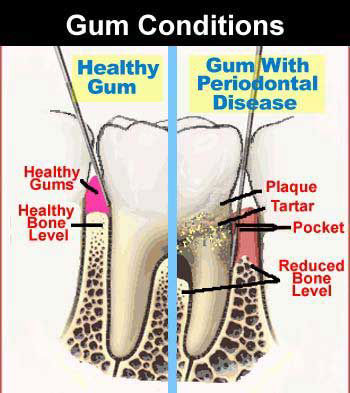Because gum disease is such a sinister problem, it's constantly on the dental world's mind. And ongoing research is uncovering new connections that make periodontal disease even more frightening. Different life changes make patients more susceptible to gum inflammation and infection, and the older the patient, the more grave the problem. Gum disease may even be linked to whole-body health problems.
It's time to kick gum disease to the curb. No matter your reason, we urge you to be proactive in the fight against oral problems. And we can help. Read on to learn more about why gum disease is such a bad guy, and how we recommend you keep it at bay.
Emerging Findings Increase Gum Disease Concerns
A University of Buffalo study investigating oral health and periodontal disease in post-menopausal women just received a huge federal grant. Why is the government spending so much money on gum disease research? Because it could be the key to unlocking complicating factors behind countless other diseases. Ongoing research supports links between periodontitis and heart disease, diabetes, some cancers, arthritis, and kidney disease. Infected gums may even be connected to Alzheimer's.
Post-menopausal women also represent a group that's at special risk of disease because of fluctuating hormones. While "pregnancy gingivitis" is a clear problem, that trend triggers questions as to exactly why changing hormone levels inflame the gums, and lead to larger-scale issues. While theories about migratory inflammation and bloodstream-borne oral bacteria exist, they have yet to be proven.
Another recent study identified the mechanism that the bacterium often responsible for gum disease manipulates tissues in a sinister way. These bacteria shut off the immune system's ability to kill it, while preserving its inflammatory response. Because the bacteria feed on byproducts of tissue inflammation, this allows them to thrive.
Are Your Gums at Risk of Periodontal Disease?

Because gum disease is so tenacious, the best practice is to keep it from taking hold in the first place. This is easier for some patients than others. If you're in a higher-risk category for gum disease, it's important to be aware of your status. You may need to take additional precautions to keep your mouth healthy.
Higher-risk patients are determined by:
If you are in a risk category, there are certain steps you can take to avoid development of disease.
Periodontal Treatment in Seattle
If your gums do succumb to disease, there's hope ahead. We offer comprehensive periodontal treatment to return your mouth to health. If you'd like to learn more, simply contact our office.
If you are in a risk category, there are certain steps you can take to avoid development of disease.

